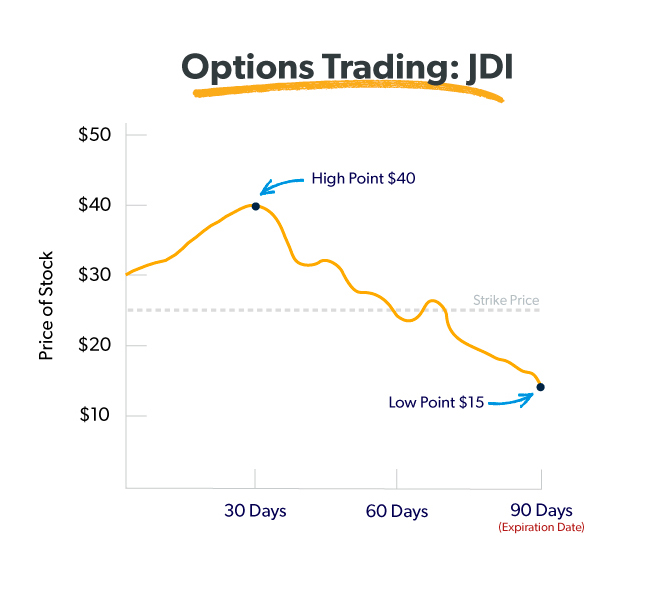Use precise geolocation data. Select personalised content. Create a personalised content profile. Measure ad performance.
What is Options Trading?
Select basic ads. Create a personalised ads profile. Select personalised ads. Apply market research to generate audience insights.
Measure content performance. Develop and improve products. List of Partners vendors. In the world of investing, there are a lot of securities in which you can invest your money: stocks , bonds, commodities , mutual funds, futures, options and more.
Discover how to trade options in a speculative market
Most investors stick with mutual funds. Of course, there is a fee, but it takes all the management worries away. Many will invest in stocks and bonds to try to capture larger gains. And some will invest in options. Options trading can be an excellent way to increase your net worth if you do it right. Options are contracts that give you the right, but not the obligation, to buy or sell a security. In essence, you purchase the option to buy or sell the security. Suppose a few days later, XYZ Company releases better than expected earnings and says that they have invented a machine that will solve world hunger.
Option Alpha Review - Is The Service Worth the Money?
XYZ Company declares bankruptcy and goes under. The confusing part is that there are more options than just the option to buy. You can take four positions when trading options. You can:. Buy a call — This was our example above, you buy the option to buy at a specific price. Sell a call — This is when you already have the stock, and you sell the option to buy to someone else. Sell a put — This is when you own the stock, and you sell the option to sell to someone else.
If you sell a call or sell a put, then your maximum gain is the premium, and you must sell if the buyer exercises their option. Now that we know what options trading is, let's take a look at the risk behind it. The issue, however, is that not all options carry the same risk. If you are the writer seller you have a different risk than if you are the holder buyer.
Call Holders — If you buy a call , you are buying the right to purchase the stock at a specific price. The upside potential is unlimited, and the downside potential is the premium that you spent.
- How to Get Rich Trading Options.
- 7 ways Canadian stock options will cost you money!
- how much money do you make forex trading.
You want the price to go up a lot so that you can buy it at a lower price. Put Holders — If you buy a put , you are buying the right to sell a stock at a specific price. The downside potential is the premium that you spent. You want the price to go down a lot so you can sell it at a higher price. Call Writers — If you sell a call, you are selling the right to purchase to someone else. The upside potential is the premium for the option; the downside potential is unlimited.

Put Writers — If you sell a put, you are selling the right to sell to someone else. The upside potential is the premium for the option, the downside potential is the amount the stock is worth. To simplify further, if you buy an option, your downside potential is the premium that you spent on the option. If you sell a call there is unlimited downside potential; if you sell a put, the downside potential is limited to the value of the stock. Options contracts were initially conceived as a way to reduce risk through hedging. Let's take a look at a few option strategies that utilize options to protect against risk.
How to start trading options
For a quick primer, see Reducing Risk With Options. Covered Calls : While a covered call is a relatively simple strategy to utilize, don't dismiss it as useless. It can be used to protect against relatively small price movements ad interim by providing the seller with the proceeds. Investors hedge to reduce risk.
By purchasing put options you can hedge a portfolio or individual position using various strategies. This hedge effectively protects your underlying stock position for a specific timeframe. One of the most popular use of options is to generate income. If you hold shares of XYZ and you believe the stock is not going to move, you can sell calls against the position to generate income from option premiums. Subsequently, closing positions at a lower price will result in a loss and underlying positions can be called if assignment occurs. Options involve risks and are not suitable for all investors as the special risks inherent to options trading may expose investors to potentially rapid and substantial losses.
Please read Characteristics and Risks of Standardized Options before investing in options. To learn more about options trading, please click this article Beginners Guide To Getting Started to view. An option is a contract between a buyer and a seller. It gives the buyers the owner or holder of the option the opportunity to buy or sell the underlying asset at a specific strike price prior to or on a specified date. Options are cost efficient with great leveraging power. As such, an investor can obtain an option position similar to a stock position without actually trading the stocks themselves, but with much more volatility risk.
Options are a popular way to hedge your positions, but when not properly understood by investors they can pose a high risk of loss. Options have the potential to deliver higher percentage returns and losses.